Sexual Misconduct Response Centre Annual Report 2020-2021
Committed. Flexible. Responsive.
Committed to those we support.
Committed: feeling wholehearted dedication and loyalty
Flexible in our approach.
Flexible: ready and able to change, to adapt to circumstances or conditions
Responsive to evolving needs.
Responsive: the quality of reacting quickly and positively to the needs of those we serve
Table of contents
Message from the Executive Director
September 2020 marked the Sexual Misconduct Response Centre’s (SMRC) five-year anniversary – an important milestone in our work to support those impacted by sexual misconduct as we seek to eradicate it in the Canadian Armed Forces (CAF). The SMRC was established in 2015 in response to the recognition by the CAF that there was a need to better support and facilitate access to confidential services for members who have experienced or been affected by sexual misconduct. Five challenging yet productive years of growth have led to an expanded mandate, a wider range of support and services, and a deepened expertise – evolving into what the SMRC is today. Reflecting on its ‘first five years’ has highlighted for me three core ‘threads’ that have been woven into our story from the very beginning: commitment, flexibility and responsiveness. They have been, and will continue to be our centre of gravity.
A year like no other, 2020-2021 has challenged the SMRC team to be resilient and to adapt our ways of working in the midst of an unprecedented pandemic. Given the health and safety protocols related to ‘in person’ interaction, we rose to the challenge and demonstrated flexibility and resourcefulness by embracing virtual technology as the ‘next best way’ to maintain momentum and advance our work in the most-impacted areas of engagement, outreach and training, wherever and whenever feasible. Despite the limitations, the team remained a cohesive, collaborative and productive unit.
The SMRC team’s ability to pivot and exemplify responsiveness continues to impress, and was particularly invaluable throughout two notable developments impacting our work during this reporting period:
- In early 2021, the Department of National Defence (DND) and the CAF reached a pivotal moment in its work to counter sexual misconduct, as several sexual misconduct revelations and allegations were made against senior CAF leaders. This news created shock waves and profound impacts throughout the CAF, as evidenced by the increased calls for support placed to the SMRC. Budget 2021, released amidst these allegations, committed funding to address sexual misconduct and gender-based violence in the CAF.
- On 24 March 2021, the CAF announced through a letter to all members that Operation HONOUR was coming to an end: “Operation HONOUR has culminated, and thus we will close it out, harvest what has worked, learn from what hasn’t, and develop a deliberate plan to go forward. We will better align the organizations and processes focused on culture change to achieve better effect.” – LGen Wayne Eyre, Acting Chief of Defence Staff. The letter further signaled that the CAF was ready to explore and embrace external review and recommendations, as well as an independent reporting chain, in order to deal with sexual misconduct and other culture and conduct problems.
The SMRC continues to provide a unique context, mindset and operational approach within the Defence Team – it operates as part of the DND under the authority of its Deputy Minister, and is independent and apart from the CAF chain of command while being responsive to CAF needs. The SMRC has strived to become a trusted organization designed to confidentially and comprehensively support members in making informed choices about potential courses of action in their individual circumstances and in navigating the system to get the help they need. At the same time, we provide advice and expertise to the CAF chain of command to increase understanding of the nature of sexual misconduct and its impact on CAF members, how to respond appropriately and support affected members effectively, and to improve preventative measures. The part of/apart from construct is essential in the execution of our SMRC mandate – we respect and hold true to its spirit and intent.
I am very proud of our unwavering commitment to an exceptional level of support and service to CAF members affected by sexual misconduct, and to CAF leadership in the form of advice and guidance, throughout a difficult year.
The growth of the services we provide, the collaborative relationships and partnerships we have built, and the progress made to date in addressing sexual misconduct in the CAF is significant. And there is much work – and growth – ahead for the SMRC as our journey continues. The next few years will see further expansion and enhanced capacity to define, inform and foster a culture of respect, while continuing to provide comprehensive, accessible and integrated support, as well as a renewed focus on prevention of military sexual misconduct.
Original signed by
Dr. Denise Preston, C. Psych.
Executive Director
Sexual Misconduct Response Centre
The first five years
Established in 2015, the SMRC’s initial mandate was to provide confidential support to CAF members who were affected by sexual misconduct. From its inception, the SMRC has been responsive to emerging needs, guided by subject matter experts and informed by evidence-based research. This is a timeline of the first five years of the SMRC.
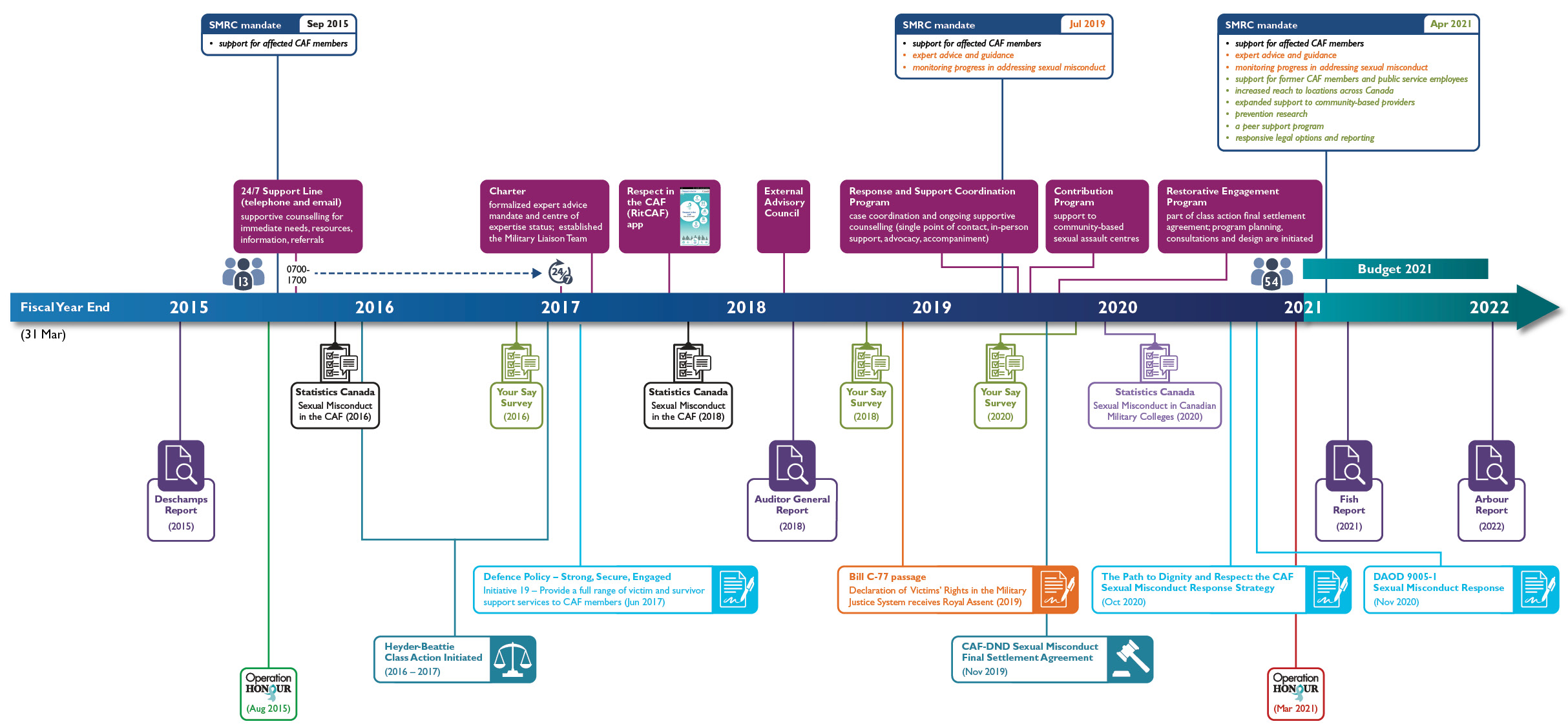
Text version of timeline
Above the timeline are milestones in the SMRC journey to date, and reflect its growth in mandate, services and workforce.
Below the timeline are external reviews and recommendations, significant events, data from multiple surveys and changes in legislation and policy that have significantly informed and shaped the growth of the SMRC from its early days to the end of 2020-2021.
Note: Fiscal year end is March 31.
Fiscal year end 2015
- Deschamps Report (2015)
- Operation HONOUR (Aug 2015): Beginning
- SMRC mandate (Sep 2015):
- support for affected CAF members
- 24/7 support line (telephone and email): supportive counselling for immediate needs, resources, information, referrals
- Support from 7am to 5pm
- 13 employees
- Statistics Canada Sexual Misconduct in the CAF (2016)
Fiscal year end 2016
- Heyder-Beattie Class Action Initiated (2016-2017)
- Your Say Survey (2016)
Fiscal year end 2017
- Support 24 hours, 7 days a week
- Defence Policy – Strong, Secure, Engage
- Initiative 19: Provide a full range of victim and survivor support services to CAF members (Jun 2017)
- Charter:
- Formalized expert advice mandate and centre of expertise status;
- Established the Military Liaison Team
- Respect in the CAF (RitCAF) app
- Statistics Canada Sexual Misconduct in the CAF (2018)
Fiscal year end 2018
- External Advisory Council
- Auditor General Report (2018)
- Your Say Survey (2018)
- Bill C-77 passage
- Declaration of Victims’ Rights in the Military Justice System received Royal Assent (2019)
Fiscal year end 2019
- SMRC mandate (Jul 2019):
- Support for affected CAF members
- Expert advice and guidance
- Monitoring progress in addressing sexual misconduct
- Response and Support Coordination Program:
- Case coordination and ongoing supportive counselling (single point of contact, in-person support, advocacy, accompaniment)
- Contribution Program:
- Support to community-based sexual assault centres
- CAF-DND Sexual Misconduct Final Settlement Agreement (Nov 2019)
- Restorative Engagement Program:
- Part of class action final settlement agreement, program planning, consultations and design are initiated
- Your Say Survey (2020)
Fiscal year end 2020
- Statistics Canada Sexual Misconduct in Canadian Military Colleges (2020)
- The Path to Dignity and Respect: the CAF Sexual Misconduct Response Strategy (Oct 2020)
- DAOD 9005-I, Sexual Misconduct Response (Nov 2020)
- 54 employees
Fiscal year end 2021
- Operation HONOUR (Mar 2021): End
- SMRC mandate (Apr 2021):
- Support for affected CAF members
- Expert advice and guidance
- Monitoring progress in addressing sexual misconduct
- Support for former CAF members and public service employees
- Increased reach to locations across Canada
- Expanded support to community-based providers
- Prevention research
- A peer support program
- Response legal options and reporting
- Fish Report (2021)
- Budget 2021, released on 19 April 2021, resulted in a further mandate expansion and will enable the work and scope of the SMRC in the years ahead. A number of strategic initiatives are described in the Moving Forward section of this report.
Fiscal year end 2022
- Arbour Report (2022)
The SMRC has developed into a centre of expertise, offering guidance on all aspects of sexual misconduct including response and support services, training and education, as well as expert policy advice and research.
Year in review
This report covers the SMRC’s activities and initiatives in the period from 1 April 2020 to 31 March 2021. Despite the challenges associated with the entire SMRC team working remotely throughout the year, owing to the COVID-19 pandemic, we continued to provide 24/7 support to CAF members affected by sexual misconduct; support to chains of command in managing incidents of sexual misconduct; expertise to CAF on policy and prevention; expanded outreach activities and research; and advanced the Restorative Engagement Program.
Our partners and stakeholders were similarly impacted by the pandemic, of course, which compelled us to optimize ‘new’ ways of collaborating and sharing information. Virtual technology became the key enabler to continue consultations, work with advisory groups and contracted subject matter experts, and respond to requests from CAF and DND leaders for advice and support in their understanding, actions and communications related to sexual misconduct.
Financial management
The SMRC’s overall expenditures totalled $6.423 million in 2020-2021. The bulk of expenditures were attributed to salaries and operations and maintenance.
| Expense | Amount |
|---|---|
| Salary | $4,900,376 |
| Operations and maintenance | $581,370 |
| Restorative engagement | $501,574 |
| Contribution program | $253,694 |
| Training | $156,803 |
| Outreach/promotion | $16,130 |
| Stakeholder relations | $13,053 |
| Total | $6,423,000 |
We made progress on a number of initiatives that were identified as priorities in our 2019-2020 Annual Report, and we started new projects. In 2020-2021 the SMRC:
- developed a new Restorative Engagement (RE) Program design framework and plan for its initial operating capability launch;
- made significant headway on Survivor Support Consultations required by the Final Settlement Agreement;
- published the SMRC Prevention Strategy;
- finalized the remaining few of the nine contribution agreements, allowing the funded centres to undertake their important work;
- worked closely with the Office of the Judge Advocate General to provide guidance and advice on the drafting of the regulations and policies as well as the training requirements related to Bill C-77; and
- continued to provide support services in a virtual environment.
The SMRC was able to accomplish all of this because of the following:
- the support and commitment from CAF and DND leadership to help eliminate sexual misconduct within the CAF;
- our collaborative and collegial partners and stakeholders within and outside the CAF;
- our ability to share best practices with our partners and allies;
- having a trusted relationship with the lived experience community;
- the SMRC recognized as a credible source of useful information and practical assistance, confidential supportive counselling, advocacy and liaison for all those affected by sexual misconduct; and
- unwavering commitment, flexibility and responsiveness of the ever-growing and evolving SMRC team.
Support services
The SMRC focuses exclusively on supporting those affected by sexual misconduct, and offers the option of anonymity and confidentiality without the requirement to report to the chain of command or the military police. There are five components:
24/7 Response and Support Line
Response and Support Coordination Program
Military Liaison Team
Restorative Engagement
Contribution Program
The SMRC is mandated to promote its services in an effort to inform and encourage members to come forward and seek services that best meet their needs.
The SMRC tracks the number of calls and emails by type in order to assess and communicate trends and issues. Trend analysis remains a critical role for the SMRC. With its independence from the CAF permitting anonymous data collection about victims, the SMRC is able to advise the CAF on trends and barriers to reporting through official mechanisms, namely the military police, the investigation service and the chain of command. The SMRC will also help identify service gaps which will allow the CAF to deliver support services more efficiently and directly where required.
What is a new case?
A new case is created in the Response and Support case management system each time an individual contacts us to discuss an incident related to sexual misconduct. There may be multiple contacts with individuals in reference to the same incident of sexual misconduct; this is all captured under the same case. It is also possible for an individual to disclose more than one incident of sexual misconduct, which would lead to the creation of other new cases. Further, different parties may contact us in reference to the same incident of sexual misconduct, but these contacts would all be captured as different cases.
24/7 response and support line
All CAF members affected by sexual misconduct can reach an SMRC Counsellor toll-free 24 hours a day, 7 days a week, and receive bilingual and confidential support, information and referrals from public service counsellors experienced in supporting individuals affected by sexual misconduct, as well as an understanding of the range of CAF programs, services and processes which exist in various sections of the CAF/DND organization. There is no triage or prioritization of calls received to ensure that support is as direct and immediate as possible, and each call is considered a new engagement.
Who is calling?
Calls and emails from individuals requesting support and information have increased steadily since the service was expanded to a 24/7 model in 2017. This past year, however, we observed an overall levelling off in the number of new cases. The number of new cases only increased marginally from 649 last year to 654 this year. That being said, there has been a marked increase in the proportion of non-CAF members using this service, up from 22% and 24% in 2018-2019 and 2019-2020, respectively, to 33% in 2020-2021.
It should be noted that as a result of ongoing work to promote and ensure data quality in the CMS, numbers presented in this Annual Report may differ from those presented in previous Annual Reports. This is the case here as this number was updated from the 628 new cases that was previously reported in the 2019-2020 Annual Report.
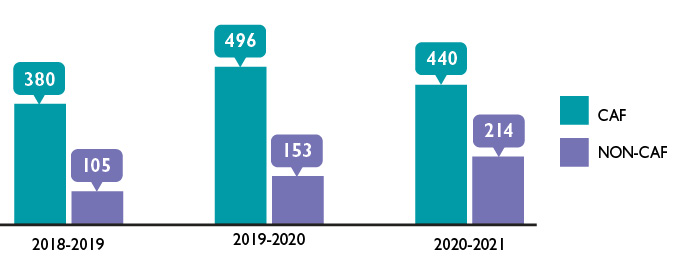
Figure 1 displays the number of new cases created in the past three fiscal years. Individuals who choose to remain anonymous, family members, and former CAF members are reported as Non-CAF
Text version of figure 1:
Client Year Number CAF 2018-2019 380 2019-2020 496 2020-2021 440 NON CAF 2018-2019 105 2019-2020 153 2020-2021 214
When examining the timing of contact with the 24/7 Response and Support Line throughout the year, there was a steady increase in the number of new cases created, with a sharp increase in the last quarter of the year. During this time, there was a 228% increase in the number of new cases from 50 in January 2021 to 164 in March 2021. The sharp increase in new cases came in the weeks following the news/media reporting of sexual misconduct allegations against several senior CAF officers.
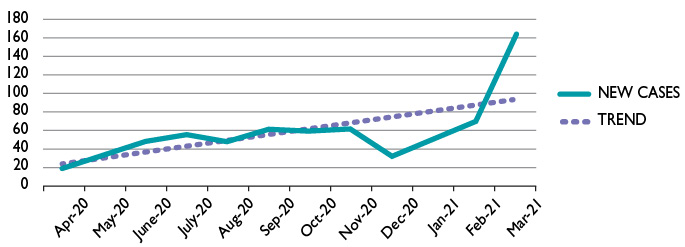
Figure 2 displays the number of new cases created each month over the 2020-2021 fiscal year.
Text version of figure 2:
Month Number of new cases April 2020 18 May 2020 34 June 2020 48 July 2020 55 August 2020 48 September 2020 61 October 2020 59 November 2020 61 December 2020 31 January 2021 50 February 2021 69 March 2021 164
The increase in the number of new cases was more pronounced amongst CAF members, as the group saw a 300% increase over the last quarter of the year, while a 136% increase was observed amongst non-CAF members.

Figure 3 displays the number of new cases created each month over the 2020-2021 fiscal year, by CAF membership status.
Text version of figure 3:
Month Client Number of
new casesApril 2020 CAF 14 NON-CAF 4 May 2020 CAF 25 NON-CAF 9 June 2020 CAF 31 NON-CAF 17 July 2020 CAF 37 NON-CAF 18 August 2020 CAF 33 NON-CAF 15 September 2020 CAF 41 NON-CAF 20 October 2020 CAF 40 NON-CAF 19 November 2020 CAF 36 NON-CAF 25 December 2020 CAF 23 NON-CAF 8 January 2021 CAF 22 NON-CAF 28 February 2021 CAF 44 NON-CAF 25 March 2021 CAF 112 NON-CAF 52
Similar to previous years, affected persons and the chain of command made up the majority of the new cases (see Figure 4), followed by third party callers (friends, colleagues, service providers) and information seekers. Family members or colleagues often contact us to obtain tools to support their loved one or colleague. Our counsellors also support bystanders who are seeking guidance as to whether or not what they witnessed could be considered sexual misconduct or whether they have taken appropriate action. We are also contacted by those accused of committing sexual misconduct.
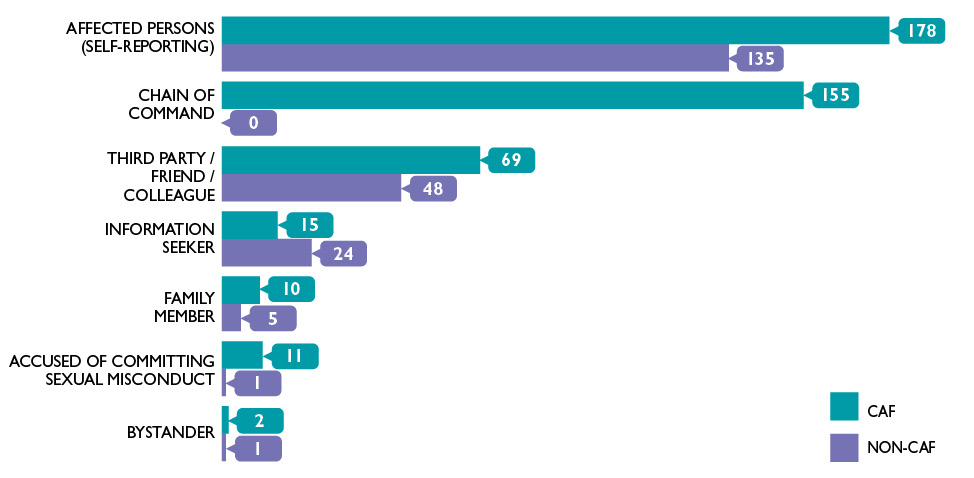
Figure 4 shows the client category for each new case. In this graphic, anonymous callers are reported as Non-CAF.
Text version of figure 4:
Client Client Category Number of Cases CAF Affected Persons (self-reporting) 178 Chain of Command 155 Third Party / Friend / Colleague 69 Information Seeker 15 Family Member 10 Accused of committing sexual misconduct 11 Bystander 2 NON-CAF Affected Person (self-reporting) 135 Chain of Command 0 Third Party / Friend / Colleague 48 Information Seeker 24 Family Member 5 Accused of committing sexual misconduct 1 Bystander 1
Fewer than 1 in 5 affected CAF members contacting the SMRC are male (17%). When we look at the gender distribution for 2020-2021, our statistics demonstrate a lower percentage of male affected CAF members who contacted us than in the previous year (e.g., 2019-2020, 21%).
Both the 2016 and 2018 Statistics Canada Survey on Sexual Misconduct in the Canadian Armed Forces suggest that about an equal number of women and men experience sexual assault, because even though women in the CAF are about three to four times more likely to be sexually assaulted than men, they represent less than 20% of the total CAF population.
The relatively low proportion of male affected CAF members who contact us suggests that there is an ongoing need for outreach specifically targeting men and to address some of the unique barriers male members might face in seeking help when they experience sexual misconduct.
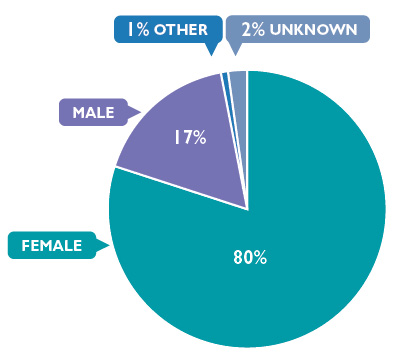
Figure 5 illustrates the gender distribution of affected CAF callers.
Note: The gender breakdown presented is based on information obtained from directly affected individuals who contact the SMRC (n = 153) and not on the new cases created for this reporting period.
Text version of figure 5:
Gender Affected Members Female 80% Male 17% Other 1% Unknown 2%
Why are they calling?
Sexual assault is the top reason why individuals contact the SMRC (36%). This is followed by sexual misconduct – unspecified (22%) and inappropriate sexualized behaviour (17%).

Figure 6 shows the reason for contact for new cases.
Note: ‘Reason for contact’ is only available for 97% of the new cases created during the reporting period (n= 634). As a result, the percentages presented are based on this smaller number of new cases where information was available.
Text version of figure 6:
Reason of Contact Number of Cases (in percentages) Sexual Assault 36% Sexual Misconduct – Unspecified 22% Inappropriate sexualized behaviour 17% Sexual Harassment 13% Request for information 6% Outside Mandate 5% Other Sexual Offence 1%
When disaggregating the reason for contacting the SMRC by CAF membership, proportions for sexual assault and other sexual offence were consistent across the two groups (CAF member and non-CAF member). A larger percentage of CAF members reported calling for a reason related to inappropriate sexualized behaviour (22% versus 6% of non-CAF members) and sexual harassment (16% versus 8% of non-CAF members) and a larger percentage of non-CAF members reported calling for a reason related to sexual misconduct – unspecified (34% versus 16% for CAF members).
What support services are being provided?
In the majority of cases (52%), 24/7 Support Line Counsellors provided information to individuals to address the specific situation they have disclosed. Supportive counselling is one of the primary services provided (27%), regardless of the nature of the incident or the client category. Referrals to the Response and Support Coordination (RSC) Program (5%) are only provided to CAF members.

Figure 7 shows the services provided for each contact.
Text version of figure 7:
Support Provided Number of Contact
(in percentages)Information 52% Supportive counselling 27% Facilitated access 9% Consultation with Military Liaison Team (MLT) 5% Referral to Response and Support Coordination (RSC) Program 5% Crisis intervention 2% Live transfer 0.1%
- Facilitated accessFootnote *
- SMRC Counsellor provides the Military Liaison Team’s (MLT) contact information to the individual or vice versa.
- Live transferFootnote *
- SMRC Counsellor immediately and successfully connects an individual with a member of the MLT.
- Crisis intervention
- Provision of immediate, short-term assistance to individuals experiencing an event that produces emotional, mental, physical and behavioural distress or problems.
Response and support coordination program
Currently serving CAF members referred (or self-referred) to this program will have an assigned Response and Support Coordinator (RSC) to ensure continuity of contact and provide ongoing support, accompaniment, advocacy and personalized case management services to help affected persons navigate systems and processes, as needed.
| # of new clients | 82 |
| # of times supportive counselling was provided | 868 |
| # of calls/emails with clients | 1,954 |
| # of months (on average) of active involvement with RSC | 6 |
| # of referrals to Military Police Liaison Officer | 42 |
| # of referrals to Military Liaison Officer | 50 |
| # of calls/emails with chain of command | 31 |
| # of calls/emails with internal and external partners | 280 |
| # of accompaniments | 0 |
The overall number of contacts (calls, emails), provision of supportive counselling and referrals have notably increased from last year. For example in 2019-2020, there were 337 contacts (calls, emails) with clients which grew to 1,954 this year. This is because the RSC Program only officially launched in August 2019. As a result, there were more active RSC clients this year, 123 compared to 52 in 2019-2020, as well as an increase in the number of Coordinators who were available to provide support to clients. While the average period of active involvement for cases that closed during the reporting period was approximately six months, 24% of the active RSC clients (n=29) have been involved with the program for more than a year. Of particular note, of the 82 new clients for this reporting period, 30% (n= 25) were opened in March 2021. This increased engagement with the RSC Program came following the news/media reporting of sexual misconduct allegations against senior CAF Leadership in February 2021.
Accompaniments are at zero for 2020-2021 as this service was put on hold during the pandemic, and will be resumed in 2022, pending public health guidelines.
Accompaniment: Response and Support Coordinators provide accompaniment to various appointments/engagements (for example, Canadian Forces National Investigation Service (CFNIS), medical, Military Police, legal), as well as court appearances (military and civilian) in order to provide the client with emotional support in cases where this has been identified as a need.
Supportive Counselling vs. Therapeutic Counselling
Supportive Counselling is focused on the “here and now”: who, what, when, where, how and why. Attention is paid to caller’s emotions and immediate needs such as identifying problems and working together to find solutions which will meet their current needs.
- Assisting with identifying and communicating needs using problem solving techniques: What will help? What would be the best outcome? How can we achieve your goal?
- Validating immediate emotions (sad, scared, angry)
- Acknowledging barriers, recognizing strengths and respecting coping strategies
- Providing and facilitating access to information on available resources, formal reporting options and complaint mechanisms
Therapeutic Counselling, such as Cognitive Behavioural Therapy (CBT), is longer term, using concrete strategies aimed at changing cognitions, emotions and a pattern of behaviour in order to improve the overall quality of one’s life.
- CBT is time and interface-based – 6 weeks to 12 months; highly structured with the therapist setting the agenda for each session based on mutually set goals
- Alliance building over time; a joint effort between therapist and client to pay attention to the cognition (thought), behaviours, emotions (feelings) triad
- Working towards attainable therapeutic goals: reduction in anxiety symptoms, reduction in symptoms of depression
A day in the life of a 24/7 support line counsellor and a response and support coordinator
What do the counsellors and coordinators have in common?
Their shared supportive counselling approach and commitment to providing relevant and timely support services to those affected by sexual misconduct – you can expect them to:
- listen with compassion
- focus on your unique situation and needs
- describe available options so you can make well-informed choices
- respect confidentiality and seek your consent before taking action
- devote the necessary time and attention to every conversation with you
How do they differ?
The 24/7 support line counsellors offer immediate support, information referrals and resources to affected members as well as to chains of command whereas the response and support coordinators offer more of a case management type of service on an ongoing basis which allows for a more in-depth model of support.
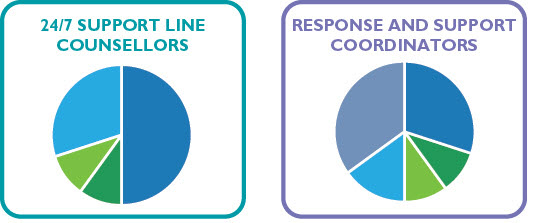
| Task | 24/7 support line counsellors | Response and support coordinators |
|---|---|---|
Information:
|
50% | 30% |
Support coordination:
|
0% | 35% |
Referrals:
|
30% | 15% |
Case administration:
|
10% | 10% |
Program:
|
10% | 10% |
What impact are we having?
“If it weren’t for the support I get from you I’m not sure where I would be today. You have helped me navigate this awful situation and make peace with my demons. All of this when no one else would support me and listen to what I needed to say, thank you so much!”
“I wish everyone knew this program existed and how awesome it is. You have helped me in ways I can’t even express. I feel ready to continue serving in the CAF now, regardless of my feelings towards certain individuals. As you said, not everyone is like them!”
“RSC is the best thing that could have happened to me after such a terrible experience. You never know how strong you are until someone takes the time to point it out to you and help you see it for yourself. I honestly don’t know where I would be today without your help.”
“Tu es la seule à qui je peux parler sans crainte, pour moi ce service est indispensable.”
A military leader who had her own experience with sexual misconduct called to find out how she could best support a subordinate who had recently disclosed to her: “Thank you for allowing me to be vulnerable with you so that I can, in turn, continue to be strong for her.”
“There is a sexual misconduct response line. It has tons of resources that can help. I wish I had known about this line. I only found out about it a couple of weeks after I reported. It has its own military police that can help. It has an option to have a third person, so you don’t have to be in direct contact with the police.”
Military liaison team
An embedded military team, the Military Liaison Team (MLT) is a key component of the SMRC's comprehensive delivery model and approach to addressing sexual misconduct. The MLT consists of Military Liaison Officers (MLO) and Military Police Liaison Officers (MPLO) from the Canadian Forces National Investigation Service (CFNIS). While their respective roles are different, collectively the MLO and MPLO provide strategic advice and perform direct military liaison between the SMRC and the CAF.
In 2020-2021, 260 individuals connected with MLO and 86 connected with MPLO.
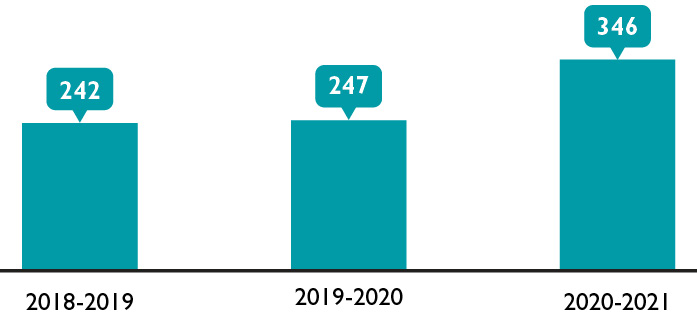
Figure 8 displays the number of individuals who contacted the MLT in the last three fiscal years.
Text version of figure 8:
Year Number of contacts 2018-2019 242 2019-2020 247 2020-2021 346
Of note, there has been a 33% decrease in contacts with MPLO over the past three years but a 128% increase in contacts with MLO over the same time period. Decrease in calls to MPLO may be due to more people reporting directly to Military Police/CFNIS.
Disclosing vs. Reporting
Disclosing is telling someone what happened, usually to break the silence and get support, without a formal investigation process being initiated.
Reporting is a formal report to the police or the chain of command, which typically results in a formal investigation process being initiated.
You can disclose without reporting. The terms should not be used interchangeably.
MLO vs. MPLO
Military Liaison Officer (MLO)
- Supports affected members in a variety of ways, from responding to the CAF members’ questions on military policies, processes and procedures, to assisting in the resolution of issues.
- Provides immediate support to chains of command in managing what can be sensitive and challenging situations, and assists them with interpreting and applying policies and procedures.
- Advises the SMRC on CAF culture, trends, policies and procedures; provides professional development sessions on CAF and rank structure for the SMRC team and actively participates in the SMRC outreach program.
- Facilitates communication amongst the SMRC, Director General Professional Military Conduct (DGPMC), the Vice Chief of the Defence Staff Group (VCDS Gp) and other L1 Staff, in order to ensure mutual understanding, unity of purpose and action, and effective implementation of the CAF’s response to sexual misconduct.
Military Police Liaison Officer (MPLO)
- Provides information to affected persons on the reporting, investigation, and associated military/civilian justice processes.
- CAF members can speak to an MPLO anonymously to obtain information on whether or not the incident they experienced meets the threshold for an offence under the Criminal Code of Canada, and on the investigative process itself, to help them make an informed decision about reporting.
- Advises the SMRC on military/civilian justice processes as it relates to sexual offences; provides military police advice in support of the development and implementation of policy relating to sexual misconduct in the CAF; and is the SMRC’s primary point of contact for the CFNIS.
- Military members do not have access to the SMRC’s confidential client information. While the CAF receives regular reports from the SMRC on the number and nature of calls, the CAF chain of command does not have access to the confidential information in the database. The case management system maintains caller confidentiality in accordance with the Privacy Act.
Restorative Engagement Program
In 2016 and 2017, several former CAF members filed class action lawsuits, claiming damages for gender discrimination, sexual harassment, and sexual assault in connection with their military service and/or employment with DND, the CAF and/or Staff of the Non-Public Funds (SNPF). A CAF-DND Sexual Misconduct Class Action Settlement, referred to as the Final Settlement Agreement (FSA), was approved by the Federal Court in November 2019. This Agreement includes an option for class members to participate in a Restorative Engagement (RE) Program, known as Schedule K. The RE program is a key component of the SMRC’s support services. It aims to create opportunities:
- where class members are supported to share their knowledge and understanding of sexual misconduct and its causes and impacts
- for representatives of the DND/CAF/SNPF to acknowledge, understand, and learn from class members’ experiences of sexual misconduct and to take responsibility, individually and collectively, for its causes and responses
- for class members and Defence representatives to identify lessons learned and to take action by contributing to broader DND/CAF/SNPF culture change efforts in real time
- to model, learn about, and build capacity for the use of a principle-based restorative approach as a response to harm and as a way to build an inclusive and respectful institutional culture now and into the future
The RE Program is being developed and will be implemented by the SMRC in partnership with the Integrated Conflict and Complaint Management (ICCM) and in consultation with persons affected by sexual misconduct, experts in restorative approaches and internal and external stakeholders. There are four phases in the RE Program (Figure 9). In 2020-2021 the focus was on Phase 2: Program Design and Development. The RE team held extensive design consultations to seek advice and guidance on all aspects of the program. In addition, an anonymous questionnaire yielded 200 responses from affected persons in the CAF, DND and SNPF. These efforts resulted in the identification of the critical elements for the Program to meet its intended purpose.
The RE team worked collaboratively with external subject matter experts to complete the initial program design framework informed by these consultations. The approach was shared with internal and external stakeholders. All groups expressed support for the program design.
In addition to the consultation and design work, the RE Program has been actively recruiting and hiring restorative practitioners across the country and has developed a plan for the initial launch of the program – its Initial Operating Capability (IOC) – planned for fall 2021.

Figure 9 illustrates the phases of RE Program.
Text version of figure 9:
Restorative Engagement Program
- Phase 1: Initiation and planning
- Phase 2: Design and development
- Phase 3: Launch and implementation
- Phase 4: Monitoring and evaluation
Contribution Program
The SMRC’s Transfer Payment Program, currently referred to as the Contribution Program and also known as the Contributions in Support of Sexual Assault Centres in Canada, funds projects from civilian sexual assault centres located near nine of the largest Canadian Forces bases. The Program seeks to address gaps in support for the CAF community by enhancing access to survivor support services.
As of April 2021, nine contribution agreements have been signed with the successful recipients, allowing the funded centres to undertake this important work. The goal was to fund ten centres across Canada, however there were no successful applications from one location despite two public calls for submissions and considerable engagement with centres in that area. In the coming year, the SMRC will be expanding this program to broaden its organizational and geographic reach, and to better meet the needs of underserved communities.
Respect in the CAF (RitCAF)
- Between March 2020 and August 2020 the RitCAF workshop was not delivered due to Public Health regulations related to COVID-19.
- From September 2020 to March 2021, there were 113 workshops delivered, with 1,224 participants. This includes the delivery of 16 RitCAF workshops in September alone (154 individuals).
- The RitCAF online application is available to download on Apple devices from the Apple iStore, and on Android devices from the Google Play Store.
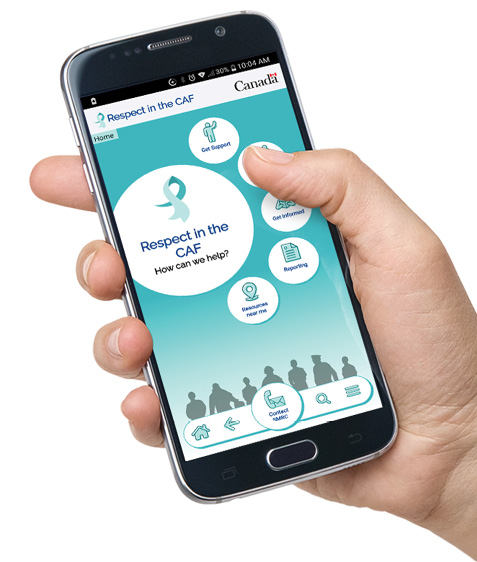
Training and education
The SMRC's Training and Education Team's work was impacted by the pandemic and as a result, the traditional ways of conducting in-person workshops, presentations and base visits were not an option. However, they were able to provide services and promote our programs virtually to internal and external audiences:
CAF Immersive Learning Platform
The CAF Immersive Learning Platform is an online training environment set at a generic CAF campus facility. Buildings on the campus contain scenario-based activities (both self-paced and facilitated) to provide CAF members a safe place to practice skills related to professional conduct and culture. Issues the learner will face include bystander intervention, misgendering, overuse of pornography, abusive language, academic dishonesty, maintaining a command climate and student-instructor relationships, among others. Over the course of 2020-2021, considerable progress was made on the platform in anticipation of launch in 2021-2022. The development of online modules is ongoing.
Royal Military College (RMC) “Building our Future” Prevention Pilot
Given the higher prevalence of sexual misconduct amongst the youngest CAF members, a top priority for primary prevention programs is to target military college and early career CAF training environments with content and delivery tailored to emerging adults. “Building our Future” is based on research indicating that emerging adults continue to develop personality, intellectual functioning, moral reasoning, decision making, impulsivity, coping, and problem-solving well into their twenties.
The program is organized into modules matched to the developmental and training/career levels. Each level is designed to introduce material in a developmentally relevant manner beginning with enhancing skills relevant to the new challenges these individuals face with regards to managing sex, relationships, and alcohol and ending with leadership skills including interpersonal and communications skills and response to disclosures. Critical material is reviewed across years, providing opportunities to “boost” previously acquired knowledge and to sustain the learning. This program was integrated into other prevention strategies being provided at RMC (for example, leadership training, chaplain and sentinel training, Respect in the CAF workshop).
A condensed version of "Building our Future" was delivered as an initial pilot to the fourth year RMC students in the 2019-2020 academic year. The goal was to pilot the content, structure, train-the-trainers approach, and to receive feedback on the entire process. Post-training feedback from this initial pilot was positive and the recommended changes were integrated into the full curriculum. The full program was scheduled to be delivered in 2020-2021, but unfortunately this was not possible due to COVID restrictions. Plans are underway for delivery during the 2021-2022 academic year.
Expert policy advice and research
Bill C-77
Bill C-77, An Act to amend the National Defence Act and to make related and consequential amendments to other Acts, received Royal Assent in 2019. The legislation adds a new Division, entitled Declaration of Victims’ Rights (DVR), to the Code of Service Discipline. The DVR will provide victims of service offences with rights to information, protection, participation and restitution, as well as a complaint mechanism for when they believe their rights have been infringed. It also provides for a Victims’ Liaison Officer to help ensure victims are properly informed and in a position to exercise their rights, by explaining the procedures regarding investigations, charges and convictions and by obtaining information requested by the victim to which they are entitled to under the DVR. Throughout 2020-2021 the SMRC continued to work with the Office of the Judge Advocate General to provide guidance and advice on the drafting of the regulations and policies as well as the training requirements related to the DVR’s implementation, set to come into force in spring 2022.
The External Advisory Council
The SMRC benefits from an External Advisory Council (EAC) on Sexual Misconduct, comprised of eight subject matter experts and leaders in Canada’s public and private sectors. The purpose of the Council is to provide independent, third party advice to the Deputy Minister and the Chief of the Defence Staff on their response and initiatives to address and eliminate sexual misconduct in the CAF.
Each member brings relevant expertise such as lived experience, experience in victim service delivery or victim advocacy, expertise with perpetrators, and representatives from academia, Veterans Affairs Canada and private corporations. EAC meetings were conducted virtually in 2020-2021 and topics included the:
- Path to Dignity and Respect
- Survivor Support Strategy
- Statistics Canada Report on Canadian Military Colleges
- Restorative Engagement program design
- Culmination of Operation HONOUR
Parliamentary appearances
Near the end of 2020-2021, interest in the issue of sexual misconduct in the CAF reached new levels in the House of Commons. With allegations of sexual misconduct surfacing against several senior CAF officers, two separate House of Commons Committees began studies on sexual misconduct in the CAF. The Defence Committee (NDDN) began its study on 19 February 2021, while the Status of Women Committee (FEWO) began its study on 23 March 2021. Even though the two committees interviewed many of the same witnesses, NDDN focused more on accountability at various levels while FEWO focused more on the experiences of those in the CAF who have experienced sexual misconduct. Dr. Preston appeared before both committees to provide expert testimony on the services and programs offered by the SMRC.
Surveys and feedback
Two events of note during 2020-2021:
Statistics Canada Survey of Sexual Misconduct at the Canadian Military College (SSMCMC)
The survey and report are called Experiences of unwanted sexualized and discriminatory behaviours and sexual assault among students at Canadian military colleges, 2019. SMRC was engaged in the CAF’s review and analysis of the results and Dr. Preston participated in DND’s technical briefings to inform relevant stakeholders of the findings.
Your Say Survey
Approximately 3,000 Regular Force and Primary Reserve members completed the most recent Your Say Survey (YSS) between 20 January and 31 March 2020. The results were published in September 2021 and we share a few findings relevant to the SMRC presented in Figure 10 and summarized here.
- Awareness of the SMRC
- The YSS results indicate that just over half of respondents (55%) have heard of the support services provided by the SMRC. This is consistent with the findings from the 2019 YSS (54%), but continues to follow a decrease from 61% in 2017 and 68% in 2016. This continues to suggest that the SMRC can do more to promote awareness of the support services we offer. The SMRC plans to significantly increase their outreach and engagement activities in 2021-2022.
- Similar results were seen on the question of whether the member knew how to access the SMRC. Most awareness of the SMRC came through briefings by the commanding officer, chain of command, or briefings/town halls conducted by an outsider. Junior NCMs were least likely (21%) to hear of the SMRC through a website, compared to the other rank groups, 28% overall. Junior NCMs were also the least likely rank group to believe the SMRC was independent of the chain of command, with just 55% agreeing to that statement, compared to 61% of senior NCMs, 68% of junior officers, and 66% of senior officers. These results are similar to past YSS results.
- Reasons for contacting the SMRC
- The most common reasons that CAF members contacted the SMRC were to obtain information (50%), seek advice or expertise for their unit (39%), or seek support for another CAF member (39%). Obtaining information and seeking advice or expertise for their unit were also amongst the top reasons for contacting the SMRC in 2019. Obtaining information has consistently been the top reason for contacting the SMRC since 2016.
- The SMRC client experience
- Most CAF Members who contacted the SMRC rated their experience favourably, reporting that their situation was well understood (86%), their needs were effectively identified (84%), the services they received were helpful (81%), and that they were referred to the appropriate services (77%). Similar results were reported in 2019, although a decrease was observed for helpfulness of the services provided (from 85% in 2019 to 81% in 2020). However, all items were rated considerably more favourably in both 2019 (agreement ranging from 77% to 86%) and 2020 (agreement ranging from 77% to 86%), as compared to 2017 (agreement ranging from 55% to 71%).
- Based on those respondents who were aware of the support services provided by the SMRC, the most commonly suggested changes for improving the SMRC support and response services included: the addition of a program that allows affected members to access independent legal advice (49%) and the satellite SMRC locations on major bases (47%). The addition of these satellite locations has been amongst the top suggested changes for the past three iterations of the YSS (2017, 2019, and 2020). In 2021-2022, as a result of funds announced in Budget 2021, the SMRC will begin work on the development of Responsive Legal Options for Victims/Survivors of Sexual Violence in the CAF and a regional expansion of the SMRC support services.
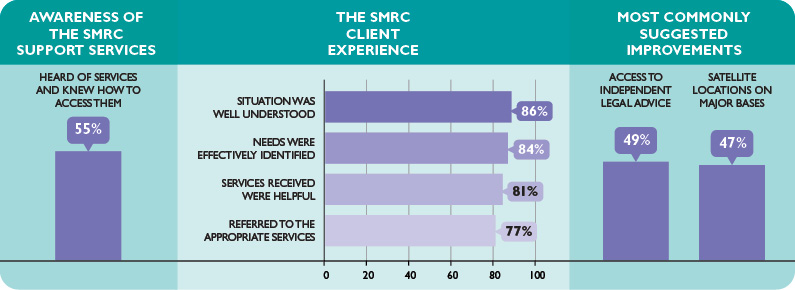
Figure 10 highlights a few YSS findings related to the SMRC client experience.
Text version of Figure 10:
Awareness of the SMRC support services
- heard of services and knew how to access them 55%
The SMRC client experience
- situation was well understood 86%
- needs were effectively identified 84%
- services received were helpful 81%
- referred to the appropriate services 77%
Most commonly suggested improvements
- access to independent legal advice 49%
- satellite locations on major bases 47%
Survivor Support Consultations
Conducting Survivor Support Consultations is a key policy measure included in the Final Settlement Agreement (FSA) to the CAF-DND Sexual Misconduct Class Action – this commitment is Schedule N to the FSA. It originates from class members’ wish to see the DND/CAF enhance the way in which those affected by sexual misconduct within the CAF are supported. It is a cornerstone of the DND/CAF’s broader efforts to put in place a robust approach to support for CAF members affected by sexual misconduct, along with a stakeholder engagement framework. The consultation process with the Survivor Support Consultation Group (SSCG) which brings together DND/CAF and class member representatives as well as subject matter experts, has been focused on the development of a CAF Survivor Support Strategy.
The SSCG’s work throughout 2020-2021 included:
- a desk review of literature on sexual misconduct, with a focus on survivor support
- a series of virtual meetings between the SSCG members and its subject matter experts
- consultation with representatives of the DND/CAF through a series of informational briefs and presentations
- discussion of potential key themes, goals, and recommendations to reflect in the SSCG’s Summary Report, with a particular focus on: survivor engagement; partnerships; research; addressing service gaps, training; communication and information; and accountability
Next steps include the completion of presentations and reports by subject matter experts to the SSCG and the drafting of a Summary Report identifying recommendations aimed at enhancing support for those affected by sexual misconduct in the CAF.
The SMRC Prevention Strategy
The SMRC Prevention Strategy reviewed the existing research literature on sexual aggression, harassment, and sexual misconduct in both civilian and military contexts. The goal of the review was to expand the CAF’s knowledge of those who commit sexual misconduct, in order to enhance:
- primary prevention strategies: promote understanding and culture change, mitigate higher risk areas and contexts
- secondary prevention strategies: identifying subgroups with a density of risk factors and/or vulnerabilities and intervening prior to an incident
- tertiary prevention strategies: appropriate responding and support following an event, applying appropriate and proportional sanctions, and identifying who requires support and intervention
The SMRC Prevention Strategy identified three important gaps in the current CAF prevention efforts. These include prevention efforts targeting:
- early intervention with the youngest CAF members (primarily ages 18 to 25 years) identified as early career and military college CAF members
- guidance and support for leadership to address the impact of leaders have on sexual misconduct among those under their command
- appropriate response, support, and intervention for sexual misconduct complaint respondents and individuals who have committed sexual misconduct
From this initiating document, the Prevention Team established their agenda of research and product development. This includes research studies designed to better understand the who, what, why, when, and where, of sexual misconduct in the CAF as well as to improve the understanding of leadership responses (for example, types of sanctions) to founded reports of sexual misconduct. Research results will be used to develop frameworks to improve consistency in responding to sexual misconduct and make recommendations for additional support and interventions, as well as adaptations of existing prevention approaches.
Moving forward
At the very end of 2020-2021 and continuing into the next fiscal year a number of events served to expedite or prioritize the SMRC’s work for 2021-2022 and include the following:
Establishment of the Chief, Professional Conduct and Culture (CPCC)
In April 2021, the Chief, Professional Conduct and Culture (CPCC) was established to align CAF culture and professional conduct with the CAF fundamental values, to strengthen professionalism across Defence in order to create a healthy, safe, and inclusive organizational culture.
Although the two organizations will work alongside one another, the SMRC will continue to be an external body, independent from the CPCC and the CAF chain of command, with its specific mandate to provide support to those affected by sexual misconduct, expert advice to the Defence Team, and monitor progress in addressing sexual misconduct. The SMRC and the new CPCC will ensure complementary yet distinct mandates, and will contribute to the identification and understanding of lessons learned.
Independent External Review
An independent external review to be led by Madame Louise Arbour was commissioned by the Minister of National Defence in April 2021. While the 2015 Deschamps report was instrumental in identifying what the problem is; this new review will take a broader look at how and why our existing workplace dynamics enable harmful behaviours, and make recommendations on preventing and eradicating sexual misconduct. This will include a comprehensive review of current policies, procedures, programs, practices, and culture within the CAF and the DND, including the mandate and independence of SMRC. Supporting Madame Arbour’s mandate represents a line of effort for the SMRC in 2021-2022.
Bill C-77
The SMRC will continue to work with the Judge Advocate General’s office on the regulations to implement Bill C-77 in the military justice system, particularly in relation to the Declaration of Victims’ Rights. Similarly, as the CAF implements the recommendations from the Third Independent Review Authority on the National Defence Act to improve the military justice system, the SMRC will be involved in approximately ten recommendations on some level, including work on the issue of Duty to Report, Restorative Justice, and the Independent Legal Advice program that was included in Budget 2021.
Policy results, data and research
In 2021-2022, the SMRC will establish a team dedicated to policy results, data and research. One of the roles of this team will be to develop a comprehensive data strategy for the SMRC that will take into account the need to monitor the CAF’s progress in addressing sexual misconduct. The latter will include obtaining appropriate access to DND/CAF data assets that collect information on sexual misconduct.
At the department level, the SMRC will be involved in an initiative led by both ADM(DIA) [Data, Innovation and Analytics] and ADM(IM) [Infrastructure Management] to assess and identify misconduct data holdings and implement an integrated solution that will address current and future data and application needs related to the management of the Defence Team’s well-being. This work will align with the SMRC’s January 2020 paper, Recommendations to Enhance Understanding and Reporting of Sexual Misconduct in the CAF.
Launch of Restorative Engagement
The SMRC continues to develop tools and protocols for service delivery and conducting the necessary recruitment, assessment and preparation for an initial group of restorative practitioners, Defence Representatives and other program staff in preparation for program launch. The RE program is scheduled to launch in initial operating capability in the fall 2021, scaling up to full operational capability in summer 2022. The program will be in place until all eligible claimants have had the opportunity to participate.
Budget 2021 and the SMRC strategic initiatives
Budget 2021 included major announcements related to sexual misconduct in the CAF. It outlined initial investments of $59.7 million over five years to expand the SMRC’s support services, with a focus on:
- enhancing internal support services to victims, including access to free, independent legal advice and enabling military members to access services without making a formal complaint
- expanding the existing sexual assault Contribution/Transfer Payment Program to provide support to community-based sexual assault service providers outside major urban military centres
- increasing the reach of the RSC Program to additional locations across Canada
- piloting online and in-person peer support groups for CAF members and former CAF members who experienced sexual misconduct during their service, tailored to military experience
- extending the SMRC’s mandate to include support services for public service employees of DND and former CAF members
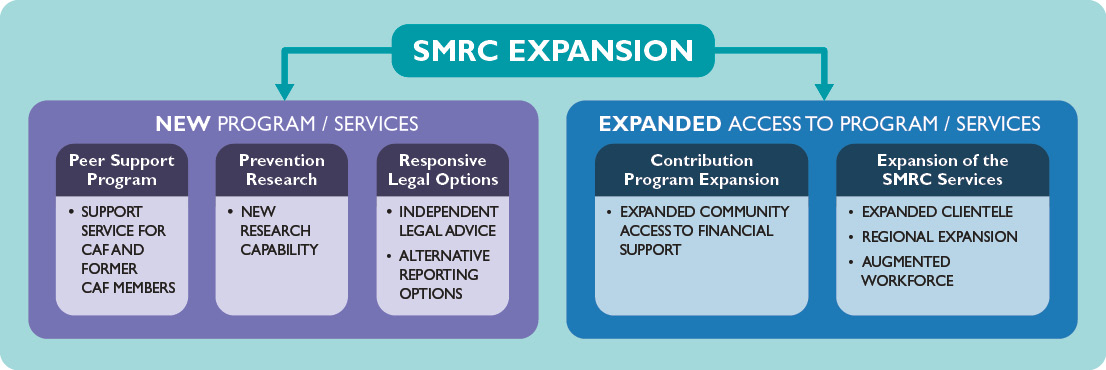
Text version of SMRC Expansion:
- SMRC Expansion
- New programs and services
- Peer Support Program
- Support service for CAF and former CAF
- Prevention research
- New research capability
- Responsive legal options
- Independent legal advice
- Alternative reporting options
- Peer Support Program
- Expanded access to programs/services
- Contribution Program expansion
- Expanded community access to financial support
- Expansion of SMRC services
- Expanded clientele
- Regional expansion
- Augmented workforce
- Contribution Program expansion
- New programs and services
- SMRC Expansion
Peer Support Program
Survivors often describe the isolation that they experience in trying to access existing support groups for sexual assault and online peer support through civilian service providers. The specific military aspects of their experiences, the military culture, and the institutional response, have a significant impact on their lived experience, and they feel somewhat alienated in primarily civilian contexts where military culture is not well understood. This initiative fills a critical gap to support CAF members and Veterans who have experienced sexual misconduct during their service. It will increase awareness about resources and services available, increase participants’ sense of empowerment and self-efficacy, decrease isolation, stigma and shame, and contribute to their overall well-being and recovery.
Prevention research
To date, research within the CAF has not been conducted on those who commit sexual misconduct, and on factors associated with the commission of these acts. There is no reliable data on these individuals in the CAF and very little is known about them. This is both a research and a policy gap, which limits both response and prevention efforts. This initiative aims to better inform sexual misconduct prevention efforts by conducting research on the commission of sexual misconduct in the CAF and developing response frameworks, guidelines, and training curriculum better targeted at subgroups at higher risk for committing sexual misconduct and those responsible for managing sexual misconduct incidents.
Responsive legal options
The lack of access to free independent legal advice, and challenges associated with existing reporting mechanisms are important gaps in victim/survivor support and services provided by the SMRC and the CAF/DND as a whole. This initiative will develop a program to provide independent legal advice to victims of service offenses and examine alternative reporting options. The latter will need to be considered in the context of work being done by the new CPCC and the External Review by Mme Arbour, both of which seek to improve reporting processes.
Contribution/transfer payment program expansion
This initiative intends to address the limitations of the current contribution program by proposing new terms and conditions for a grant-based model of funding with expanded eligibility criteria to better reach underserved survivors in any region impacted by the presence of the CAF in Canada, and increasing the collaboration between community-based and CAF service providers. This initiative will transition the program from contribution-only funding to primarily grant-based funding; expand eligible recipients from sexual assault centres-only, to any community-based service providers that are able to support survivors, victims, and persons impacted by CAF sexual misconduct; and, expand geographic eligibility requirements beyond “close proximity to CAF bases with highest client base” to any region which is impacted by the presence of the CAF.
Expansion of the SMRC services
Budget 2021 expanded the SMRC’s mandate to now include former CAF members and civilian members of the Defence Team, in addition to CAF members. This expansion will allow the SMRC to reach more individuals within the broader Defence community to provide ongoing support services and allow for resources to be scaled to regional requirements. The expanded footprint of the RSC program to five regions across Canada, including locations in the National Capital Region (NCR)/Ontario, Quebec, Atlantic, Central and Pacific, as well as the expected increase in calls to the 24/7 support line, requires hiring of additional counsellors. There will also be a need to increase support personnel (for example, administrative, business management, project management) as the SMRC adds operational functions and modifies their organizational structure to meet the expanded mandate.
Conclusion
Over the SMRC’s first five years of operation, we have learned a great deal about structural, cultural, systemic, and individual factors that either contribute to the occurrence of sexual misconduct in the CAF or that negatively impact reporting, responding, and resolution after the fact. The tremendous support and commitment to achieving an environment free of sexual misconduct will continue to strengthen the SMRC’s resolve and ability to build upon our current body of knowledge, expertise and experience. Creating an environment that fosters talking about and understanding the causes and impacts of sexual misconduct will help change the culture that enables it.
For many reasons, 2020-2021 was a challenging year. As our mandate and services evolve as described herein, we will continue to strive to be evidence-informed, to consider and implement recommendations from formal reviews as well as advice from external subject matter experts, to seek input from those with lived experience, and to research and educate on all matters related to sexual misconduct.
We seek to adapt and continuously improve to ensure an efficient, effective and relevant response to sexual misconduct within the CAF. A busy year ahead, indeed. The SMRC team’s commitment, flexibility and responsiveness will undoubtedly help us rise to the challenges in 2021-2022 and beyond.

